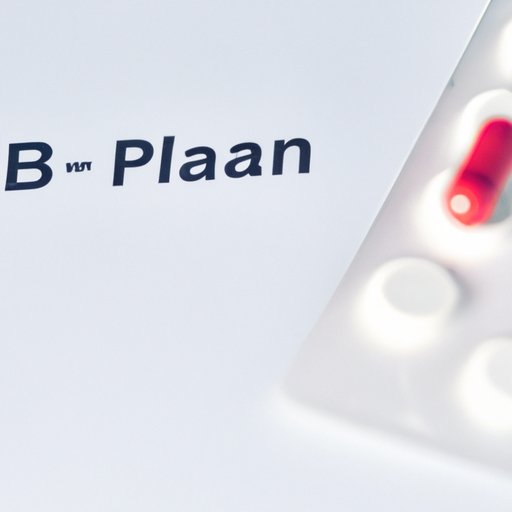
Introduction
Unprotected sex can happen, and it can leave you feeling vulnerable and anxious about the possibility of an unplanned pregnancy. Fortunately, emergency contraception like Plan B is available as a backup option if traditional birth control methods fail or are not used. However, what happens if you take Plan B after ovulation? In this article, we will explore the science behind taking Plan B after ovulation, its effectiveness, and the risks associated with its use.
The Science Behind Taking Plan B After Ovulation and How It Affects Your Body
First, let’s briefly understand what happens during ovulation. Ovulation is a process in which the ovaries release an egg, which then travels down the fallopian tube and can be fertilized by sperm. The fertilized egg then implants in the uterus and begins to develop into a fetus. If the egg is not fertilized, it breaks down and is shed during menstruation.
Plan B works by delaying ovulation, preventing the release of an egg, and making it more difficult for sperm to fertilize an egg by thickening cervical mucus. However, if ovulation has already occurred, Plan B will not prevent pregnancy.
Studies have shown that Plan B is most effective when taken within 72 hours of unprotected sex. However, it can still be effective for up to five days (120 hours) after sex, although the effectiveness decreases over time.
It is also important to note that taking Plan B after ovulation can affect your menstrual cycle. It can cause irregular bleeding or spotting and may change the timing of your next period.
Is It Too Late? Understanding the Effectiveness of Plan B After Ovulation
Ovulation typically occurs around day 14 of a 28-day menstrual cycle. However, the timing may vary from person to person and can be affected by factors such as stress, illness, and hormonal imbalances.
As mentioned earlier, Plan B works by delaying ovulation, so if ovulation has already occurred, it may not be effective in preventing pregnancy. According to studies, the effectiveness of Plan B after ovulation decreases significantly compared to its effectiveness before ovulation. In fact, one study found that Plan B was only 24% effective when taken after ovulation compared to 95% effective before ovulation.
Factors that can affect the effectiveness of Plan B after ovulation include the timing of intercourse, the number of eggs that have been released, and the lifespan of sperm. Therefore, it is important to understand that taking Plan B after ovulation may still result in pregnancy.
The Risks of Taking Plan B After Ovulation: What You Need to Know
While Plan B is generally considered safe, there are potential risks and side effects associated with its use. Some common side effects may include nausea, headache, abdominal pain, fatigue, and dizziness. These symptoms typically go away on their own within a few days.
However, taking Plan B after ovulation may increase the risk of ectopic pregnancy, which occurs when the fertilized egg implants outside the uterus. Ectopic pregnancy can be life-threatening and requires immediate medical attention. It is essential to talk to a healthcare provider before taking Plan B and to seek medical attention if you experience any unusual symptoms after taking it.
Emergency Contraception: When to Take Plan B for Optimal Results
Emergency contraception like Plan B should only be used as backup contraception and not as a regular form of birth control. It is intended for use after unprotected sex or contraceptive failure and should be taken as soon as possible for optimal results.
The optimal time to take Plan B is within 72 hours of unprotected sex. It is still effective up to five days (120 hours) after sex, but its effectiveness decreases over time. There are also other emergency contraception options available, such as the copper IUD or Ella, which may be more effective for some individuals.
Plan B and Ovulation: How Timing Affects Your Chances of Conception
Ovulation timing plays a crucial role in the likelihood of conception. If you have unprotected sex before ovulation, there is a higher chance of getting pregnant. If you take Plan B before ovulation, it can significantly decrease the risk of pregnancy. However, if you take Plan B after ovulation, its effectiveness decreases, and there is still a chance of getting pregnant.
Personal Experiences of Taking Plan B After Ovulation: Stories from Real Women
Personal experiences can provide insight into the effectiveness and risks of taking Plan B after ovulation. Some women have reported taking Plan B after ovulation and still not getting pregnant, while others have reported experiencing irregular bleeding and other side effects.
It is important to remember that everyone’s experience can be different, and taking Plan B after ovulation may not guarantee contraception. It is always best to talk to a healthcare provider before taking Plan B and to discuss which contraception method may be most effective for your situation.
Conclusion
Emergency contraception like Plan B can provide peace of mind after unprotected sex or contraceptive failure. However, taking Plan B after ovulation may not be as effective in preventing pregnancy, and there may be potential risks and side effects associated with its use. It is important to understand the science behind taking Plan B after ovulation, its effectiveness, and the potential risks to make an informed decision about emergency contraception. It is always best to speak with a healthcare provider to discuss which contraception method may be most effective for your situation.




